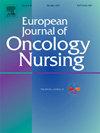Key components for a weight management intervention for breast cancer patients – Results from a focus group study
IF 2.7
3区 医学
Q1 NURSING
引用次数: 0
Abstract
Objectives
While weight gain after cancer diagnosis is associated with higher tumor recurrence rates, morbidity, and poorer overall survival, appropriate weight management programs are insufficiently available. This study aimed to identify the key features for a multimodal weight management intervention from patients' and healthcare professionals’ (HCP) perspectives.
Methods
Patients treated for breast cancer at the Netherlands Cancer Institute were invited to participate in one of two online focus groups; HCPs were recruited via LinkedIn and participated in a single online focus group. All three 90-minute focus groups were moderated using a semi-structured interview guide. Recordings were transcribed and coded using thematic content analysis.
Results
Nine patients and seven HCPs participated. Themes applicable for patients were: 1) Absence of information; 2) Combining weight management with daily activities and responsibilities; 3) Physical and psychological side-effects; 4): Integrating weight management in treatment continuum. For HCPs, themes were: 1) Health education; 2) Integrating weight management in treatment continuum; 3) Role of healthcare insurance companies.
Conclusion
Multimodal lifestyle interventions designed to prevent and reduce weight gain in breast cancer patients are needed. Awareness should be raised for HCPs and patients.
Practice implications
For equal accessibility, cost-effective lifestyle interventions are ideally covered by healthcare insurance companies.
乳腺癌患者体重管理干预的关键组成部分——焦点小组研究的结果
虽然癌症诊断后体重增加与较高的肿瘤复发率、发病率和较差的总生存率相关,但适当的体重管理方案尚不充分。本研究旨在从患者和医疗保健专业人员(HCP)的角度确定多模式体重管理干预的关键特征。在荷兰癌症研究所接受乳腺癌治疗的患者被邀请参加两个在线焦点小组之一;医护人员是通过领英(LinkedIn)招募的,他们参加了一个单独的在线焦点小组。所有三个90分钟的焦点小组都使用半结构化访谈指南进行调节。使用主题内容分析对录音进行转录和编码。结果9例患者和7名HCPs参与。适用于患者的主题有:1)信息缺失;2)将体重管理与日常活动和职责相结合;3)生理和心理副作用;4):在治疗过程中整合体重管理。卫生保健专业人员的主题是:1)健康教育;2)在治疗过程中整合体重管理;3)医疗保险公司的作用。结论多模式生活方式干预是预防和减少乳腺癌患者体重增加的必要措施。应提高医务人员和患者的认识。实践意义对于平等的可及性,具有成本效益的生活方式干预措施最好由医疗保险公司承担。
本文章由计算机程序翻译,如有差异,请以英文原文为准。
求助全文
约1分钟内获得全文
求助全文
来源期刊
CiteScore
4.40
自引率
3.60%
发文量
109
审稿时长
57 days
期刊介绍:
The European Journal of Oncology Nursing is an international journal which publishes research of direct relevance to patient care, nurse education, management and policy development. EJON is proud to be the official journal of the European Oncology Nursing Society.
The journal publishes the following types of papers:
• Original research articles
• Review articles

 求助内容:
求助内容: 应助结果提醒方式:
应助结果提醒方式:


